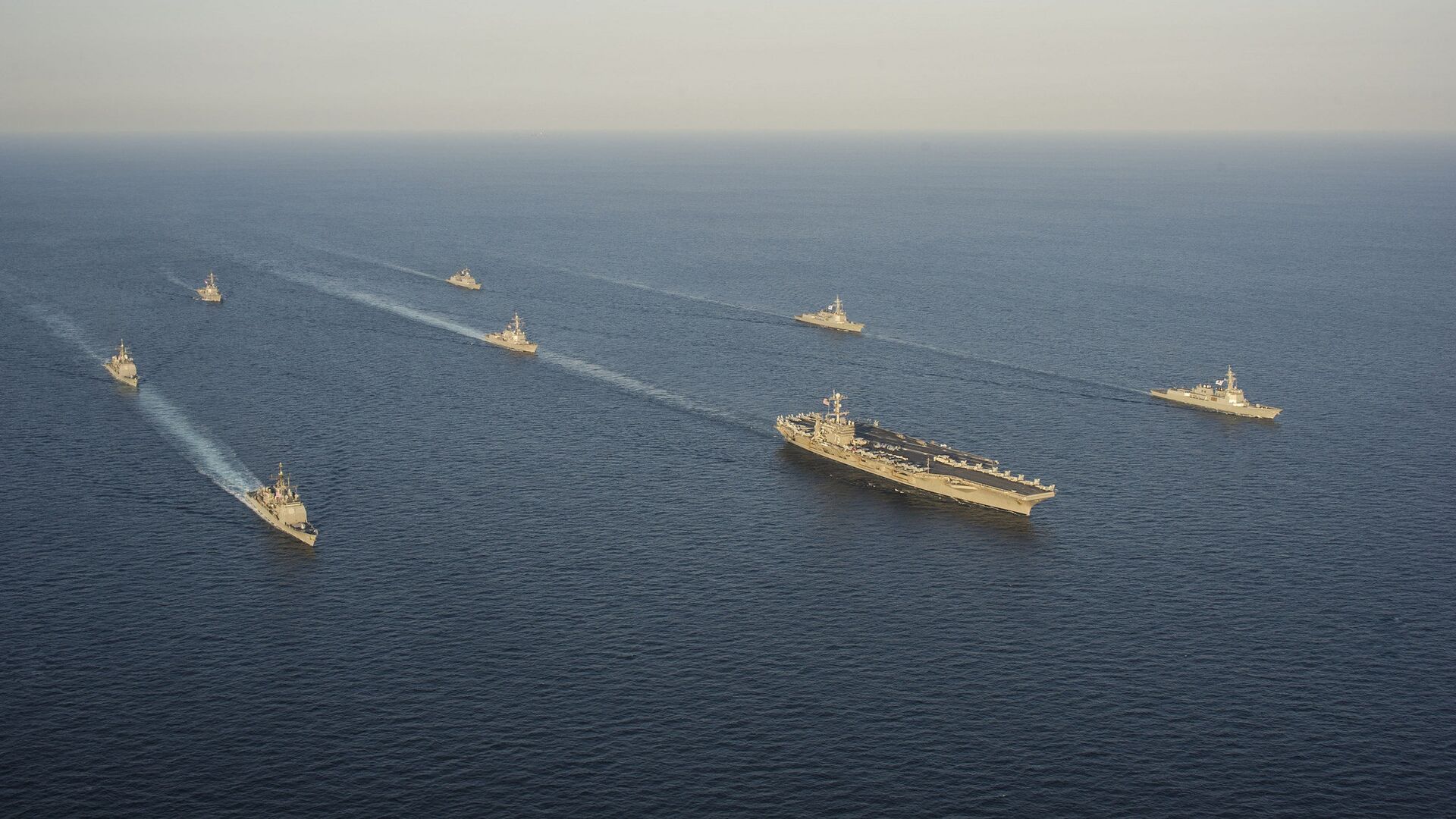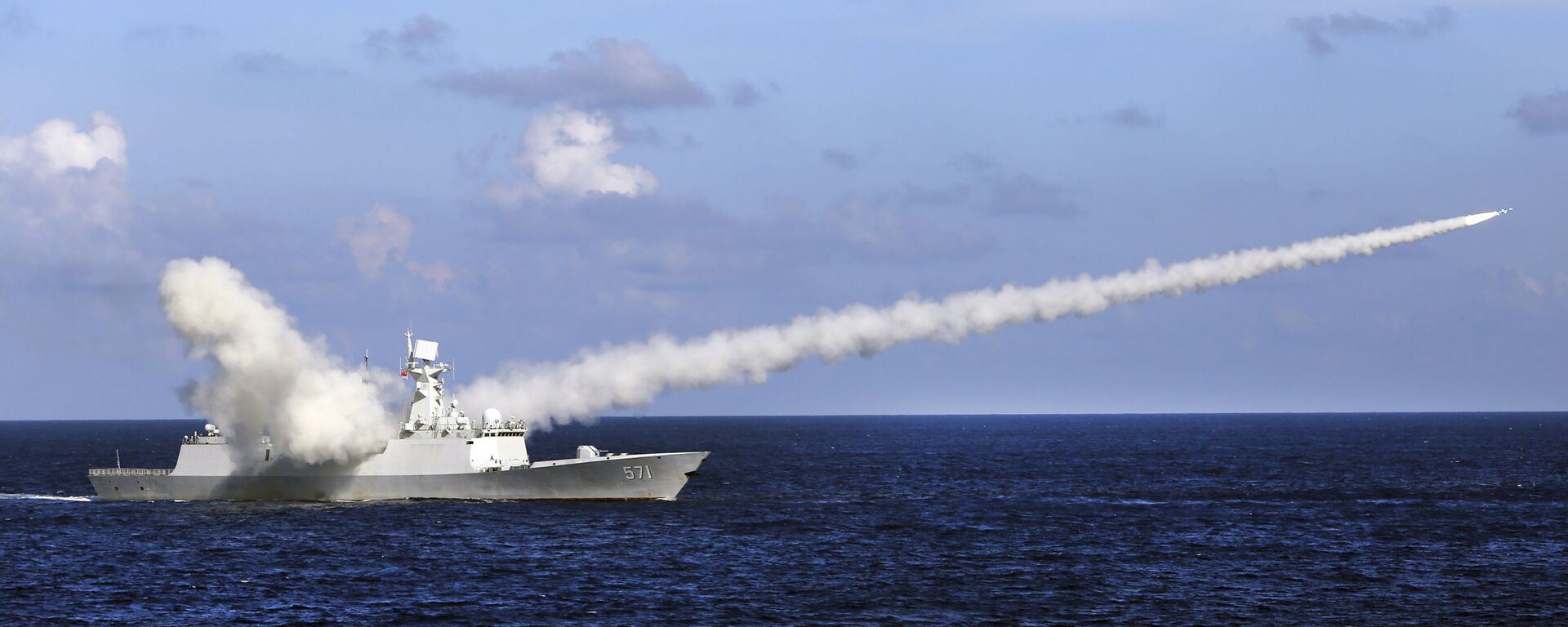https://sputnikglobe.com/20220712/australia-urges-us-to-boost-military-presence-to-avoid-catastrophic-failure-in-asia-pacific-1097213201.html
Australia Urges US to Boost Military Presence to Avoid 'Catastrophic Failure' in Asia-Pacific
Australia Urges US to Boost Military Presence to Avoid 'Catastrophic Failure' in Asia-Pacific
Sputnik International
The bilateral relationship between Australia and China deteriorated in 2020 for a number of reasons, resulting in a significant shift in Canberra's defense... 12.07.2022, Sputnik International
2022-07-12T08:48+0000
2022-07-12T08:48+0000
2022-10-19T20:02+0000
china
south china sea
southeast asia
malabar exercise
rimpac
australia
anthony albanese
indo-pacific
asia
sputnik
https://cdn1.img.sputnikglobe.com/img/105116/68/1051166864_0:211:2048:1363_1920x0_80_0_0_65d4c8735f68d6a01f01938d5ae2546b.jpg
Australia's Defense Minister Richard Marles on Monday called on the United States to boost its military presence in the region to avoid what he described as "a catastrophic failure of deterrence".Without naming China, the successor of hawkish Peter Dutton in the Anthony Albanese government argued that the region is witnessing the biggest military build-up since the end of the Second World War, raising an alarm about the "development and deployment of new weapons" by the adversary that challenged the West's "military capability edge."The minister said that using force or coercion to advance territorial claims, "as is occurring in the South China Sea", is worrying Australia since China can do this in any place in the Indo-Pacific "where borders or sovereignty are disputed".Urging expansion of the exercises and operational deployment, Australia's defense minister said Canberra would look for more defense cooperation with India, South Korea, and Southeast Asian nations. On its part, the Aussies Defense Minister vowed to raise investment to increase the "range and lethality" to make forces capable of "high-intensity war fighting"."This will include capabilities such as longer-range strike weapons, cyber capabilities and area denial systems tailored to a broader range of threats, including preventing coercive or grey-zone activities from escalating into conventional conflict," Marles, who is on his first visit to the US as Defense Minister, explained.Describing AUKUS, a three-nation pact launched last September, as a "game-changer", the Australian minister said that cooperation between Australia, the UK, and the US is "more than just a capability program for nuclear-powered submarines".The US and its Pacific allies have been trying to bring "like-minded" nations on a platform for months as China expands its outreach in the region. In April, it signed a security pact with the Solomon Islands, a Pacific nation that has, so far, complete dependency on Australia for its security needs.The Albanese administration slammed China for alleged "coercive" economic behavior while claiming to be willing to repair diplomatic ties with Beijing.The bilateral relations ruptured in 2020 after China imposed higher tariffs on Australian exports, including trade barriers for barley, wine, seafood, and coal. Beijing's action has been seen primarily as a response to Canberra's decision to ban Huawei from Australia's 5G network and demand an independent investigation into the origins of COVID-19.
https://sputnikglobe.com/20220607/china-warns-australia-to-stop-military-provocations-in-south-china-sea-1096082009.html
china
south china sea
southeast asia
australia
indo-pacific
Sputnik International
feedback@sputniknews.com
+74956456601
MIA „Rosiya Segodnya“
2022
Rishikesh Kumar
https://cdn1.img.sputnikglobe.com/img/07e4/08/04/1080055820_0:0:388:389_100x100_80_0_0_40018ee210946d65d49ffba4f4c008e1.jpg
Rishikesh Kumar
https://cdn1.img.sputnikglobe.com/img/07e4/08/04/1080055820_0:0:388:389_100x100_80_0_0_40018ee210946d65d49ffba4f4c008e1.jpg
News
en_EN
Sputnik International
feedback@sputniknews.com
+74956456601
MIA „Rosiya Segodnya“
Sputnik International
feedback@sputniknews.com
+74956456601
MIA „Rosiya Segodnya“
Rishikesh Kumar
https://cdn1.img.sputnikglobe.com/img/07e4/08/04/1080055820_0:0:388:389_100x100_80_0_0_40018ee210946d65d49ffba4f4c008e1.jpg
china, south china sea, southeast asia, malabar exercise, rimpac, australia, anthony albanese, indo-pacific, sputnik
china, south china sea, southeast asia, malabar exercise, rimpac, australia, anthony albanese, indo-pacific, sputnik
Australia Urges US to Boost Military Presence to Avoid 'Catastrophic Failure' in Asia-Pacific
08:48 GMT 12.07.2022 (Updated: 20:02 GMT 19.10.2022) The bilateral relationship between Australia and China deteriorated in 2020 for a number of reasons, resulting in a significant shift in Canberra's defense strategy with a massive jump in the annual military budget. The Albanese government has indicated restoring ties with China but underlined that it would not compromise its "national interests".
Australia's Defense Minister Richard Marles on Monday called on the United States to boost its military presence in the region to avoid what he described as "a catastrophic failure of deterrence".
Without naming China, the successor of
hawkish Peter Dutton in the Anthony Albanese government argued that the region is witnessing the biggest military build-up since the end of the Second World War, raising an alarm about the "development and deployment of new weapons" by the adversary that challenged the West's
"military capability edge.""It is completely changing the strategic circumstances of the Indo-Pacific, and I think, beyond that, the world…It will need to contribute to a more effective balance of military power, aimed at avoiding a catastrophic failure of deterrence," Marles said while delivering a speech to the Washington-based Center for Strategic and International Studies (CSIS).
The minister said that using force or coercion to advance territorial claims, "as is occurring in the South China Sea", is worrying Australia since China can do this in any place in the Indo-Pacific "where borders or sovereignty are disputed".
Urging expansion of the exercises and operational deployment, Australia's defense minister said Canberra would look for more defense cooperation with India, South Korea, and Southeast Asian nations.
"We want to expand exercises and operational deployments in the region, drawing on the success of exercises such as TALISMAN SABRE, RIMPAC and MALABAR," he underlined.
On its part, the Aussies Defense Minister vowed to raise investment to increase the "range and lethality" to make forces capable of "high-intensity war fighting".
"This will include capabilities such as longer-range strike weapons, cyber capabilities and area denial systems tailored to a broader range of threats, including preventing coercive or grey-zone activities from escalating into conventional conflict," Marles, who is on his first visit to the US as Defense Minister, explained.
Describing AUKUS, a three-nation pact launched last September, as a "game-changer", the Australian minister said that cooperation between Australia, the UK, and the US is "more than just a capability program for nuclear-powered submarines".
The US and its Pacific allies have been trying to bring "like-minded" nations on a platform for months as China expands its outreach in the region. In April, it
signed a security pact with the Solomon Islands, a Pacific nation that has, so far, complete dependency on Australia for its security needs.
The Albanese administration slammed China for alleged
"coercive" economic behavior while claiming to be willing to repair diplomatic ties with Beijing.
The bilateral relations ruptured in 2020 after China imposed higher tariffs on Australian exports, including trade barriers for barley, wine, seafood, and coal. Beijing's action has been seen primarily as a response to Canberra's decision to ban Huawei from Australia's 5G network and demand an independent investigation into the origins of COVID-19.






